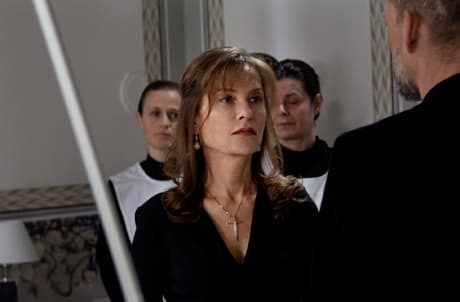Again tackling a controversial topic without necessarily saying anything about it, Italian director Marco Bellocchio follows up Vincere (his take on Mussolini's love affair) with a more political dalliance, in the form of Dormant Beauty.
This time out, he's stepped into modern times by presenting the hot button topic of euthanasia as it relates to the Eluana Englaro controversy, wherein a father spent 17 years trying to take his vegetative daughter off the feeding tube keeping her alive.
But instead of addressing that bit of history head-on, he takes the subject as a framing news story and presents three related narratives to show different perspectives on the subject.
In one, a senator (Toni Servillo) vacillates in opinion while preparing for a parliamentary debate on the issue, while his daughter (Alba Rohrwacher) protests in the streets for her pro-life agenda, prioritizing screwing a stranger over her political beliefs. In another, a famous actress (Isabelle Huppert) wastes her talents and time caring for her comatose daughter. And in the last story, a doctor (Pier Giorgio Bellocchio) spends his time preventing the suicide of a meth addict (Maya Sansa).
Each story is blended together into a weirdly ineffective and melodramatic tapestry that acknowledges only the broadest of beliefs and concepts pertaining to euthanasia. Being an Italian film, Catholicism obviously plays a role in guiding some characters, while science contrarily guides others. Why each character believes what they do is implicit and superficial, leaving us little reason to care about, or connect with, their struggle.
What's worse is that Bellocchio's style is that of grandiose melodrama, heightening every moment of perceived conflict with sweeping stylization that never hones on the intimate to contextualize the flowery end result. It's as though he's trying to mask his tenuous handling of the subject and lackadaisical detailing of characters with showy theatrics and dramatic close-ups to imply there's actually something there.
Unfortunately, all that's there is a lot of big acting and trite character arcs.
(Cattleya)This time out, he's stepped into modern times by presenting the hot button topic of euthanasia as it relates to the Eluana Englaro controversy, wherein a father spent 17 years trying to take his vegetative daughter off the feeding tube keeping her alive.
But instead of addressing that bit of history head-on, he takes the subject as a framing news story and presents three related narratives to show different perspectives on the subject.
In one, a senator (Toni Servillo) vacillates in opinion while preparing for a parliamentary debate on the issue, while his daughter (Alba Rohrwacher) protests in the streets for her pro-life agenda, prioritizing screwing a stranger over her political beliefs. In another, a famous actress (Isabelle Huppert) wastes her talents and time caring for her comatose daughter. And in the last story, a doctor (Pier Giorgio Bellocchio) spends his time preventing the suicide of a meth addict (Maya Sansa).
Each story is blended together into a weirdly ineffective and melodramatic tapestry that acknowledges only the broadest of beliefs and concepts pertaining to euthanasia. Being an Italian film, Catholicism obviously plays a role in guiding some characters, while science contrarily guides others. Why each character believes what they do is implicit and superficial, leaving us little reason to care about, or connect with, their struggle.
What's worse is that Bellocchio's style is that of grandiose melodrama, heightening every moment of perceived conflict with sweeping stylization that never hones on the intimate to contextualize the flowery end result. It's as though he's trying to mask his tenuous handling of the subject and lackadaisical detailing of characters with showy theatrics and dramatic close-ups to imply there's actually something there.
Unfortunately, all that's there is a lot of big acting and trite character arcs.
